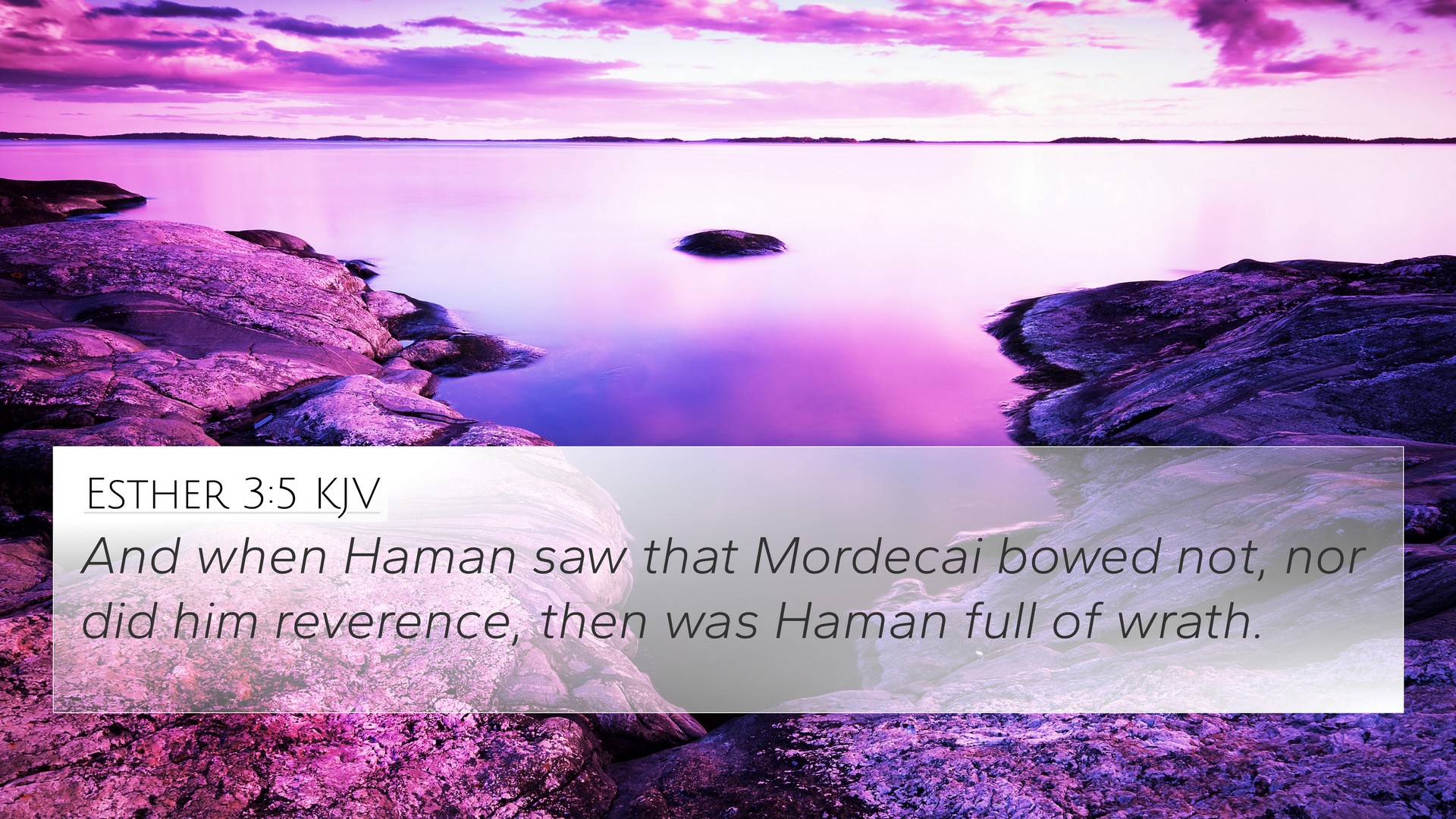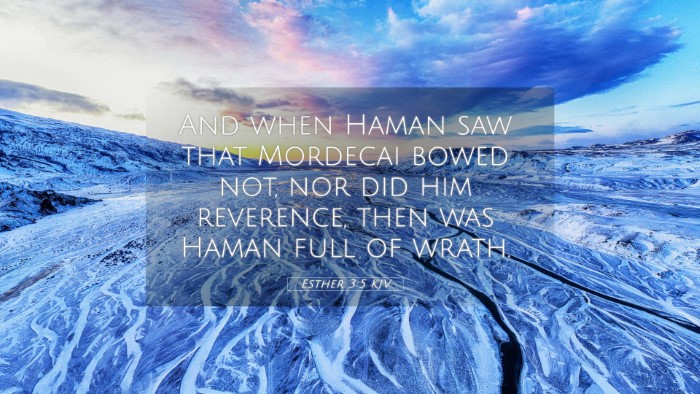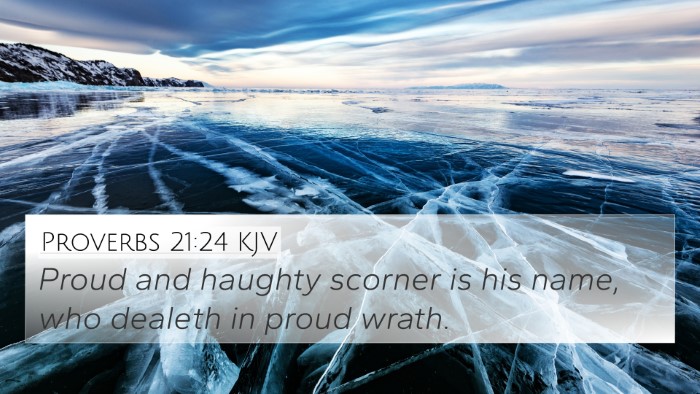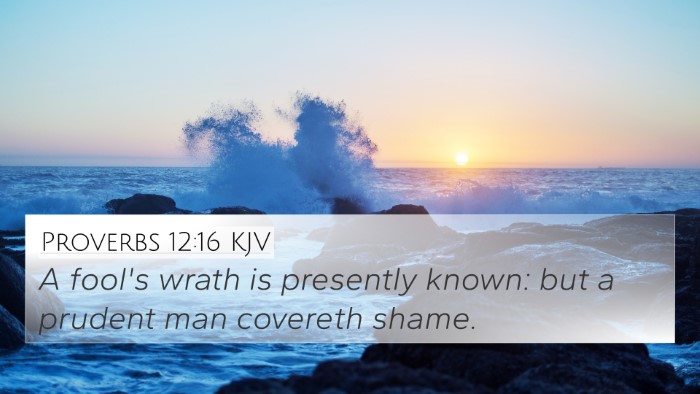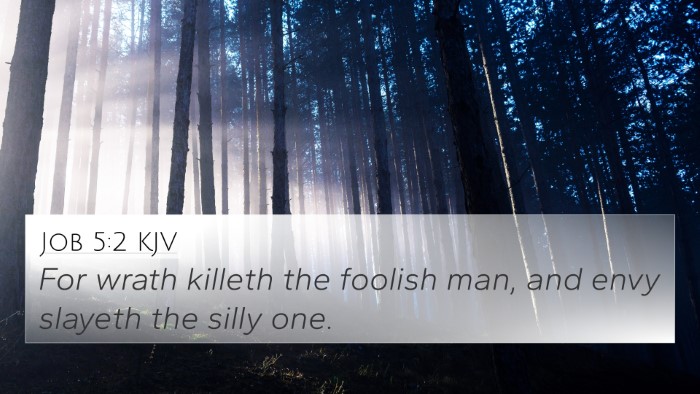Old Testament
Genesis Exodus Leviticus Numbers Deuteronomy Joshua Judges Ruth 1 Samuel 2 Samuel 1 Kings 2 Kings 1 Chronicles 2 Chronicles Ezra Nehemiah Esther Job Psalms Proverbs Ecclesiastes Song of Solomon Isaiah Jeremiah Lamentations Ezekiel Daniel Hosea Joel Amos Obadiah Jonah Micah Nahum Habakkuk Zephaniah Haggai Zechariah MalachiEsther 3:5 Similar Verses
Esther 3:5 Cross References
And when Haman saw that Mordecai bowed not, nor did him reverence, then was Haman full of wrath.
Uncover the Rich Themes and Topics of This Bible Verse
Listed below are the Bible themes associated with Esther 3:5. We invite you to explore each theme to gain deeper insights into the Scriptures.
Esther 3:5 Cross Reference Verses
This section features a detailed cross-reference designed to enrich your understanding of the Scriptures. Below, you will find carefully selected verses that echo the themes and teachings related to Esther 3:5 KJV. Click on any image to explore detailed analyses of related Bible verses and uncover deeper theological insights.
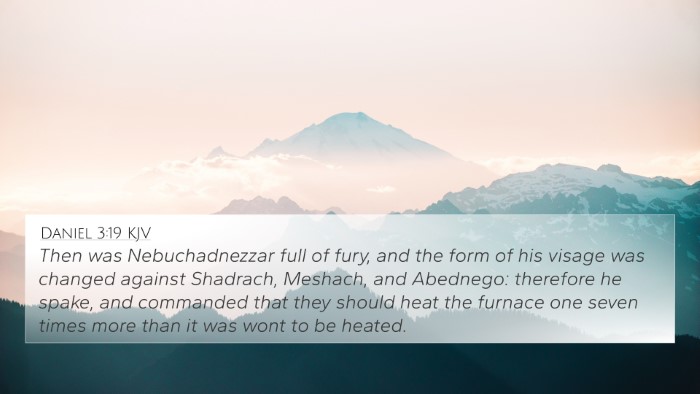
Daniel 3:19 (KJV) »
Then was Nebuchadnezzar full of fury, and the form of his visage was changed against Shadrach, Meshach, and Abednego: therefore he spake, and commanded that they should heat the furnace one seven times more than it was wont to be heated.
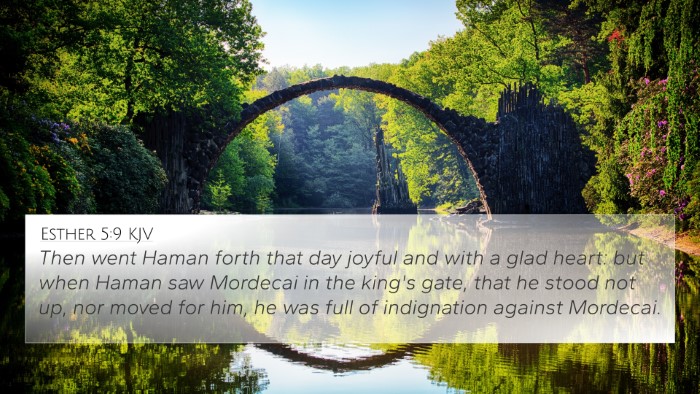
Esther 5:9 (KJV) »
Then went Haman forth that day joyful and with a glad heart: but when Haman saw Mordecai in the king's gate, that he stood not up, nor moved for him, he was full of indignation against Mordecai.
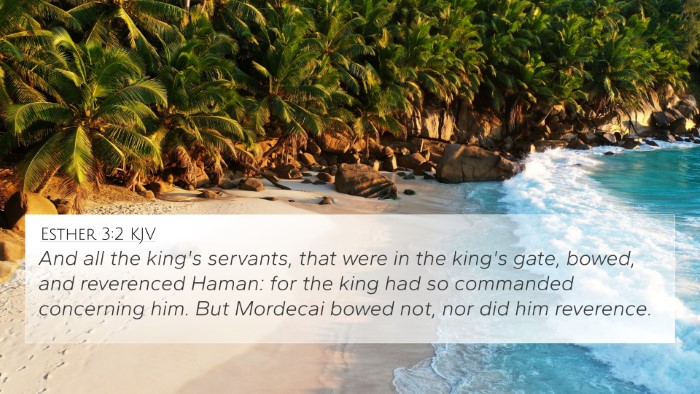
Esther 3:2 (KJV) »
And all the king's servants, that were in the king's gate, bowed, and reverenced Haman: for the king had so commanded concerning him. But Mordecai bowed not, nor did him reverence.
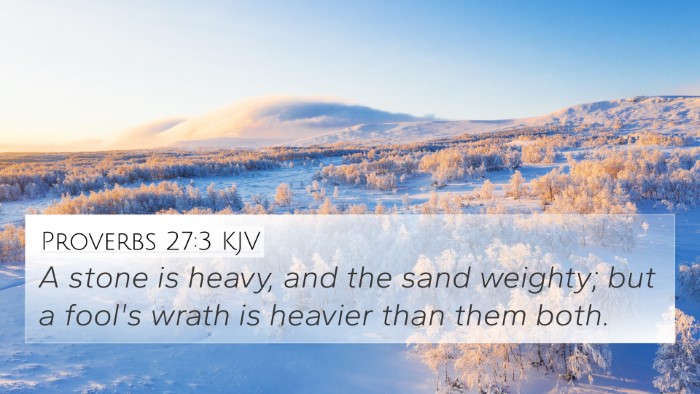
Proverbs 27:3 (KJV) »
A stone is heavy, and the sand weighty; but a fool's wrath is heavier than them both.
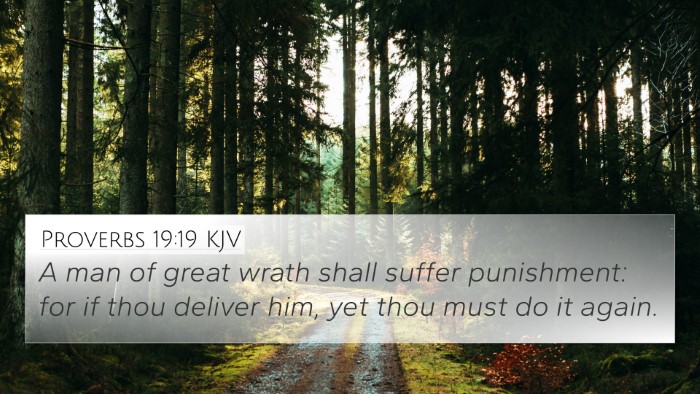
Proverbs 19:19 (KJV) »
A man of great wrath shall suffer punishment: for if thou deliver him, yet thou must do it again.
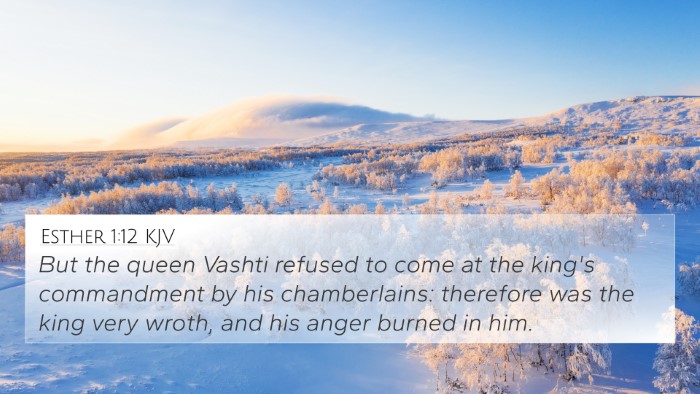
Esther 1:12 (KJV) »
But the queen Vashti refused to come at the king's commandment by his chamberlains: therefore was the king very wroth, and his anger burned in him.
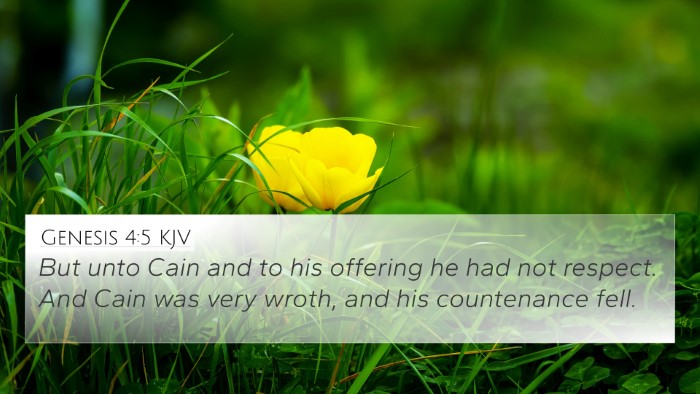
Genesis 4:5 (KJV) »
But unto Cain and to his offering he had not respect. And Cain was very wroth, and his countenance fell.
Esther 3:5 Verse Analysis and Similar Verses
Understanding Esther 3:5
Bible Verse: "And when Haman saw that Mordecai bowed not, nor did him reverence, then was Haman full of wrath."
Summary of the Verse
This verse highlights the conflict between Haman and Mordecai, marking a pivotal moment in the Book of Esther. Haman’s anger towards Mordecai for not showing him respect serves as a catalyst for the events that follow, demonstrating the profound implications of personal honor and enmity in the narrative.
Contextual Analysis
Esther 3:5 appears in a broader context where political and social tensions are palpable. Haman, a high-ranking official in the Persian court, expected reverence from those around him, including Mordecai. Mordecai's refusal to bow shows not only personal but also communal resistance against oppression.
Commentary Insights
Matthew Henry: Haman's fury illustrates how pride can lead to destructive consequences. His expectations of reverence reflect a deeper theme of authority and rebellion. Henry emphasizes that Mordecai’s refusal signifies fidelity to God over man, alluding to the idea that not all forms of authority deserve submission.
Albert Barnes: Barnes points out the impulsive nature of human emotions as seen in Haman's wrath. He elaborates on how disrespect can provoke jealousy and revenge, setting the groundwork for a larger narrative of impending doom for the Jews. Haman’s reaction serves as a reminder of the consequences that arise from personal grievances.
Adam Clarke: Clarke elaborates on the historical context of Persian customs regarding honor. He notes how Haman's status demanded reverence, and the breach of this etiquette provoked a severe response. Clarke interprets this event not only as a personal affront but also as a symbol of the scapegoating that often arises from favoritism in societies.
Thematic Connections
The themes within Esther 3:5 resonate throughout the Bible, reflecting humanity's longstanding issues with pride, honor, and the moral dilemmas faced when standing for righteousness. This provides fertile ground for cross-referencing other scriptures.
Bible Verse Cross-References
- Proverbs 16:18: "Pride goes before destruction, and a haughty spirit before a fall." - A direct parallel to Haman’s pride leading to his downfall.
- 1 Samuel 15:23: "For rebellion is as the sin of witchcraft, and stubbornness is as iniquity and idolatry." - Connects to Mordecai's defiance against Haman's expectations.
- Daniel 3:16-18: The story of Shadrach, Meshach, and Abednego illustrates standing firm in faith despite societal pressures.
- Matthew 23:12: "Whoever exalts himself will be humbled..." - A fitting warning against Haman’s pride.
- James 4:6: "God opposes the proud, but gives grace to the humble." - Reinforces the consequences of pride evident in Haman’s actions.
- Esther 5:9: Haman's pride intensifies in subsequent passages, leading to greater plots against Mordecai.
- Ephesians 6:12: Highlights the spiritual battles that accompany personal conflicts, much like the strife between Haman and Mordecai.
Cross-Referencing Biblical Texts
When studying this verse, one can utilize tools for Bible cross-referencing to delve deeper into related passages, gaining insight into recurring biblical themes and character responses. Effective cross-referencing can reveal underlying patterns, such as pride leading to downfall and the importance of loyalty.
How to Use Bible Cross-References
Utilizing a Bible concordance or a Bible cross-reference guide allows readers to identify connections between verses, enhancing understanding through thematic Bible verse connections. Engaging in cross-reference Bible study methods can enrich one’s grasp of scripture dynamics.
Inter-Biblical Dialogue
This verse engenders conversations throughout the Bible, allowing believers to draw parallels and identify lessons applicable today. For example, the interaction between Mordecai's integrity and Haman's ambition illustrates the timeless struggle between good and evil, loyalty and pride.
Conclusion
Esther 3:5 encapsulates critical elements of conflict, pride, and the spiritual battles inherent in human relationships. By examining cross-references, one can glean richer insights and forge deeper connections within the biblical text. This approach not only enhances individual understanding but also promotes dialogue among verses, revealing the cohesive narrative strand present throughout scripture.
